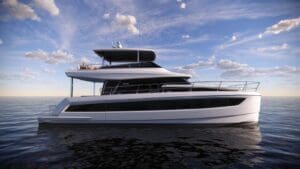What is the difference between a yacht dealer and yacht charter company and why should you care? Well, when you buy a new yacht, you have a reasonable expectation of good after sales service with warranty issues to be taken care of. You would also expect, in the case of the yacht business management program, that projections will be met and that the program meets scrutiny by the IRS as was promised. You would expect the yacht dealer or charter company, who sold you the boat in the first place to be responsible, right? Well, unfortunately, this is not exactly the case once a third party gets involved.
So, what is the difference and why?
Yacht Dealer
A dealer’s primary business is to sell boats for a chosen manufacturer and their primary income is derived from selling boats. In order to expand their market and sell boats into the charter market, a yacht dealer cobbles together a group of smaller charter companies and uses them to sell boats into charter fleets. This is purely sales driven and does not constitute a commitment to be involved in the operation of the vessel after the deal has closed.
Once the deal is consummated, the relationship ends here between buyer and yacht dealer and this is where things get a little fuzzy. The buyer now has to rely on a third party, the charter company, to provide service, help with warranty issues and fulfill sales projections. Unfortunately, the charter company has very little incentive to deliver on promised revenues or deal with warranty issues, as they did not partake in sales revenues and the buyer has to fend for himself
Charter Company
A charter company’s primary business is chartering boats. Their primary income is derived from selling charters on boats in their fleet. Buying a boat from a charter company specifically for charter in their fleet provides the buyer with an on-going seamless relationship from buying, to chartering to warranty issues between manufacturer and buyer, to selling it at the end of the program. The buyer never has to deal with anyone other than the charter company from whom they bought the boat in the first place. There is no confusion as to who is accountable to the buyer.
Warranty and After Sales Service
When doing the due diligence to decide whom to partner with when placing a yacht into an active yacht business type program, there are many factors to consider. The question is: Who is accountable or responsible if the vessel has a problem or does not perform according to pro forma projections, promised by the selling entity?
Yacht Dealer
- Dealers are appointed or set up to service geographical regions or areas for a manufacturer in order to sell specific brands and provide after sales service for that brand. The dealer earns a sales commission for this service and the business model dictates that all customer service issues in the territory are taken care of by the dealer.
- Regional dealers are not set up to provide service in other areas. In the event of a warranty claim the owner would have to rely on a third party for service. Because the third party would not have participated in the sale of the boat, their services would be billable to the owner rather than the dealer. It could cost the owner a lot of money and reimbursements could take a very long time, if at all. Third party repairs could also possibly void any warranties. Regional dealers simply cannot provide reliable or cost effective service to any buyer outside of their territory. They are not set up to do so and to claim otherwise is not true. How does a dealer in the USA service an owner in the Caribbean effectively on an ongoing basis if they have no presence or operation there?
Charter Company
- Bases all over the world so your yacht will never be outside of the control of the charter company no matter what location you choose.
- All warranties and maintenance for the full duration of the program are handled by the charter company’s staff directly with the manufacturer.
- The charter company is responsible for the occupancy, financial performance as well as the care of the yacht so there is seamless accountability with no third parties involved to confuse who is answerable to the owner.
Financial Projections
Yacht Dealer
- A dealer in a seasonal location such as Annapolis, Maryland, has to move boats between locations, e.g., Annapolis to Bahamas, to meet performance and revenue criteria in order to comply with IRS requirements. The boat owner now has to rely on a third party charter company (in the Bahamas in our example) for specific performance and warranty repairs. Who is accountable for performance? The financial projections that form part of the business plan are a critical component when making the decision to place a yacht into a corporation and operate it as a small business.
- If the financial model does not work, one is faced with not only a situation where the business will have to be subsidized by the owner, but will also create an IRS compliance risk. The assumption of a certain level of income generated by the boat is one of the cornerstones to ensure that the business is viable and can stand tax-related scrutiny. One of the tests for “Hobby Loss” is that if the business makes a profit three out of five years, it cannot be ruled to be a “Hobby Loss” and is therefore legitimately in business. The other option is to show that the business has the intent and the ability to make a profit, which is more difficult to prove, and thus makes the accuracy of the pro forma important. Third party charter companies do not have the obligation to perform.
- The yacht dealer will introduce the buyer to a CPA who will confirm the business model. They are usually well-versed in the program, but are essentially part of the dealer’s sales team and cannot be solely relied upon by the buyer to make sound decisions. It is prudent to get your personal “trusted advisor” to sign off on the program. Based on that, you can plan your yacht business, but again, with no obligation of performance from the thrird party.
- Another question that should be asked is how reliable the third party charter operator is and will they be in business for the duration of the program? How exposed will the yacht owner be in this case?
- So, ultimately who is responsible to meet projections? Who is booking the boat and who is responsible for the occupancy in this scenario?
Charter Company
- The charter company is responsible for the occupancy, financial performance, and care of the yacht for the full duration of the program. There is seamless accountability with no third parties involved to confuse who is accountable to the owner.
- Your charter management company you work with should be able to provide references from owners who have been in the program of interest for extended periods. They should also be able to proviide historical data supporting the shared financials. No matter what charter management company you decide to work with, make sure you get a list of owners and check the references to be sure that what is being represented is in factual and accurate.
- Charter companies, especially the major ones, have large fleets with 30 + locations worldwide as well as robust and reliable booking systems and booking agents. This chartering infrastructure ensures they are stable and reliable. Once again, accountability and responsibility are seamless no matter where your yacht goes within the charter company’s network.
The Charter Management Program
While many yacht dealers claim to have some sort of proprietary system or program to help owners establish a small business to operate their yachts, the truth is that the tax advantages and the basis of what is being offered is available to any US taxpayer and is in the public domain. There is nothing of substance being offered that is proprietary. This is simply Section 179 and IRS tax rules that have been skinned to create a yacht ownership program. Therefore buyers are not constrained to specific yacht dealers for placing a yacht into management or an ownership program. All the tax advantages are freely available to all from the company of their choice.
Placing a yacht into a business ownership program in order to benefit from tax advantages is not for everybody. Quite a number of issues and actions must be planned and taken care of. For example:
- Before you start a business, draw up a business plan to ensure that you are establishing a viable business.
- Make an effort to obtain a recognized certification or operators license related to the business. The best would be an ICC (International Certificate of Competency) or a USCG license.
- Show proof of active participation and meet one of the IRS tests, which you can find on the IRS web site.
- Structure your business to ensure that you do not fall into the “Hobby Loss” category. Some key actions are to establish a website and place classified advertisements in sailing magazines.
- Attend at least one trade show per year.
- Renegotiate your agreements with the charter company that you co-manage your yacht with (preferably this should be done seasonally).
- Establish additional income streams to supplement the income from charter operations such as commission from sales of charters on your yacht or other yachts in the fleet.
- Sell or refer buyers to the charter operators yacht sales team and claim commissions for this activity. Often, this can be done when your yacht is unavailable for a requested date.
- Limit your owner use for pleasure to below 10% of the charter time annually.
- Ensure you have insurance specifically covering your yacht’s business activities.
- Keep detailed records for all business activities in case it is ever scrutinized.
International Charter Company Advantages
- Yacht owners benefit from worldwide sailing through the reciprocal owner use privileges. For example, in the case of Dream Yacht Charter, Annapolis boat owners benefit from this program with reciprocal use by being able to sail at any other.
- Some charter companies will let you customize your yacht exactly how you want it especially in a Performance Program.
- Some charter companies offer multiple brands so not only can you customize, you can also choose your brand – Lagoon, Fountaine Pajot, Catana, Bali, Neel trimarans, Beneteau, Jeanneau, Dufour
- A Performance Program allows you to choose how long you want to be in the program, you can leave whenever it suits you with reasonable notice to cover existing bookings (normally 6 months).
- Make sure that your chosen charter company is approved by all the marine-lending institutions that offer unlimited charter finance as opposed to lenders that only offer limited charter (70 days or 10 weeks). Be sure to get unlimited charter finance to not only squarely put you into a well-documented “Hobby Loss” situation if the business is ever scrutinized by the IRS, but also it will not limit your options for how you use your yacht. You will be asked to sign a waiver by lenders who cannot offer unlimited finance limiting you to the 10 weeks. Remember that if you go over the limit the bank has the right to call your loan. I am not saying it will happen, but this is something a boat buyer needs to know.
None of the above is a secret or proprietary information. Choose a sales team who has many years of experience setting up yachts in business ownership programs and will be able to assist and advise you all the way through. Accountability is key!





